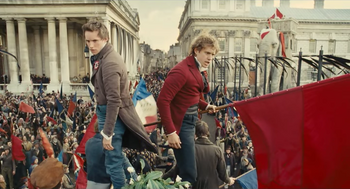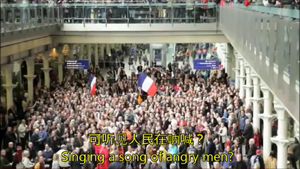
|
| "Do You Hear the People Sing?" | |
|---|---|
 | |
| Composer | |
| Lyricist | |
| Performers | |
| Previous |
"ABC Café / Red and Black" (musical) |
| Next |
I Saw Him Once (1985 cast only) |
"Do You Hear the People Sing?" (also known as "The People's Song") is one of the principle and most recognisable songs from the musical. It takes place after ABC Café / Red and Black. After it was announced that General Lamarque has died, Enjolras and The Friends of the ABC revolt against the way of living. The song is sung near the end of the first act, and is once again sung by almost the entire cast at the end of the musical's Finale. Instrumentally, the theme is also prominent in the battle scenes. In the 2012 film, it is performed after One Day More.
The lyrics were written by Herbert Kretzmer.
Overview[]
The song, composed by Claude-Michel Schönberg (music), Alain Boublil and Jean-Marc Natel (original French lyrics), and Herbert Kretzmer (English lyrics) is first sung in Act I by Enjolras and the other students at the ABC Cafe as they prepare themselves to launch a rebellion in the streets of Paris during the funeral procession of General Jean Maximilien Lamarque. The song is sung again in the finale as the final song of the musical. This second version, which immediately follows a number by Jean Valjean and others, is sung by the entire cast with revised lyrics, and becomes progressively louder with each stanza.
The song is a revolutionary call for people to overcome adversity. The "barricades" referred to in the song are erected by the rebel students in the streets of Paris in the musical's second act. They are to draw the National Guard into combat and ignite a civilian uprising to overthrow the government, but their rebellion eventually fails.
Use in various languages[]
- The original French version of the musical did not end with the full ensemble singing this song; It only later became the musical's finale song when it was revamped for the English-language version.
- At a special concert marking the tenth anniversary of Les Misérables in 1995, "Do You Hear the People Sing?" was sung by 17 different actors who had played Jean Valjean around the world. Each actor sang a line of the song in his own language. The languages sung were English, French, German, Japanese, Hungarian, Swedish, Polish, Dutch, Norwegian, Czech, Danish, and Icelandic.
- Another unofficial adaptation of "Do You Hear the People Sing?" is in Turkish, named "Duyuyor Musun Bizi İşte Çapulcu'nun Sesi" and sang during Gezi Park Protests.
- In Chinese-language speaking countries/regions, there are many versions of the song. A popular Mandarin Chinese (Standard Chinese/普通话) version: 民众呐喊 is a singable translation authentic to the original English lyrics. Other Chinese dialects include Cantonese – 問誰未發聲 and Taiwanese – 你敢有聽着咱的歌 versions are mixtures of dialect translation from the English lyrics and specific references to corresponding political protests (see below).
- In June 2013, in the aftermath of the Arab Spring, the song was adapted in Arabic and performed by all 27 contestants from across the Arab world on the final episode of season 2 of Arab Idol, and is titled "Hear the Voice of the Oppressed" (Arabic: سامع صوت المقهورين). Another adaptation was created by Fabrica, an Egyptian theatrical team, in Egyptian dialect (سامع صوت الجماهير). The song, among few others from the musical, was performed on Albernameg (episode 27 – season 3) and aired on 14 June 2013.
Use as a protest song[]
There are unofficial adaptations of "Do You Hear the People Sing?" in Cantonese and Taiwanese, intended as actual protest songs; better known versions include "Asking Who That Hasn't Spoken Out" (問誰未發聲), written in Cantonese for Occupy Central with Love and Peace, and "Lí Kám Ū Thiann-tio̍h Lán Ê Kua" (你敢有聽着咱的歌) in Taiwanese Hokkien.
The song can be heard in protests in Hong Kong as recently as September 2019, when students sang this song over the national anthem during a secondary school's opening assembly. The song was initially removed on music platforms including QQ Music in mainland China because of its widespread usage in anti-extradition bill protests, while its English version was later removed from those platforms.
Aside from the aforementioned Cantonese and Taiwanese Hokkien adaptations, The Telegraph said that the song "has long chimed with people protesting around the world", adding that it was heard at the 2011 Wisconsin protests, the 2013 protests in Turkey, and a protest against the opening of a McDonald's restaurant in Australia in 2013. It has also been used by anti-TTIP protesters who have interrupted TTIP congresses as flashmobs singing the song.
The song was also used in support of the Maidan protests in 2014 by the group Ukraine 2020, who released a music video for the song on YouTube.
In 2016, the song was used as a protest song in South Korea's nationwide Park Geun-hye resignation movement.
In 2017, the song was translated into Filipino by theater artists Vincent de Jesus, Rody Vera, and Joel Saracho, and has been performed at rallies to protest the killing of activists and drug suspects under Philippine President Rodrigo Duterte, and again following the 2022 Philippine presidential election.
Iraqis involved in the protests in 2019 also released a video with the song used.
In September 2020, a number of MSLU students in Minsk, Belarus, were detained after performing the song in the lobby of their educational institution. The students were protesting after president Alexander Lukashenko's disputed re-election.
In April 2022, the song was used as a protest song in 2022 Sri Lankan protests against the government of president Gotabaya Rajapaksa.
In April 2022, a clip of the 2012 film version of the song circulated on Twitter in protest of the lockdown during the 2022 Shanghai COVID-19 outbreak. The clip was ultimately blocked by the Chinese government to stop further protest.
Use in politics[]
On 16 September 2016, during his presidential campaign, Donald Trump used the song in a rally in Miami under the parody title Les Déplorables, a response to Hillary Clinton's controversial "basket of deplorables" label. On 15 November 2022, it was among the songs played before Trump announced his 2024 presidential campaign.
Lyrics[]
Enjolras:
Do you hear the people sing?
Singing the song of angry men?
It is the music of a people
Who will not be slaves again!
When the beating of your heart
Echoes the beating of the drums
There is a life about to start
When tomorrow comes!
Combeferre:
Will you join in our crusade?
Who will be strong and stand with me?
Beyond the barricade
Is there a world you long to see?
Courfeyrac:
Then join in the fight
That will give you the right to be free...
Chorus:
Do you hear the people sing?
Singing the song of angry men?
It is the music of a people
Who will not be slaves again!
When the beating of your heart
Echoes the beating of the drums
There is a life about to start
When tomorrow comes!
Feuilly:
Will you give all you can give
So that our banner may advance?
Some will fall and some will live
Will you stand up and take your chance?
The blood of the martyrs
Will water the meadows of France!
Chorus:
Do you hear the people sing?
Singing the song of angry men?
It is the music of a people
Who will not be slaves again!
When the beating of your heart
Echoes the beating of the drums
There is a life about to start
When tomorrow comes!
Trivia[]
- In the Polish version the song is titled: "Słuchaj kiedy śpiewa lud" which means "Listen when the people sing"
- In the Spanish production the song is called "La Canción del Pueblo", which translates to "The Song of the People."
- In the 2012 movie, the lines are sung by all of the students together. However, at the line "Then join in the fight/That will give you the right to be free...", the camera focuses on Enjolras, whose voice is then heard clearly amongst the rest of the students.
- The original French version is called A la volonté du peuple - The Will of the People. Christian Ratellin was the original musical Enjolras. Michel Sardou originally sang the song on the original French concept album.
- During the 04th October 2023 performance of the West End production, five members of the UK activist group Just Stop Oil bicycle locked themselves to the stage and invaded the performance towards the end of the song. Stage managers cleared the stage, the song was stopped, the audience was evacuated and the Metropolitan Police were called to the theatre. Unfortunately there was not enough time to continue the rest of the performance.
- The song is commonly invoked by as a protest song against authoritarian regimes:
- Protests that have invoked the song include the 2013-14 Euromaidan Protests, the 2016-17 South Korean Protests, the 2019-20 Hong Kong Protests, the 2020-21 Thai protests, and the 2021-present Myanmar protests.
- There's a Filipino version of this song. That is fan made and the song became the anthem for Philippines National Protest Day. Also Known as Ferdinand Marcos Day the former president of the Philippines. [1][2]
- There are many versions of the song in Chinese [3]. A popular Mandarin Chinese (Standard Chinese/普通话) version - 民众呐喊 [4] is a singable translation authentic to the original English lyrics.
Videos[]
References[]
- ↑ https://www.azlyrics.com/lyrics/julieannesanjose/naririnigmoba.html
- ↑ http://preen.inquirer.net/57199/filipino-version-of-iconic-les-miserables-song-becomes-national-day-of-protest-anthem
- ↑ https://en.wikipedia.org/wiki/Do_You_Hear_the_People_Sing%3F#Use_in_various_languages
- ↑ https://www.youtube.com/watch?v=6p5jL7M325U&t=120&list=PLq6GAPInDuO5cGdvHIWZXm6RMt8FZYjDg








